Dili
| Dili | |
|---|---|
 |
|
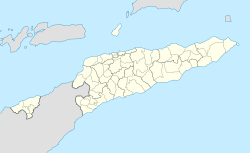 Dili
|
|
| Coordinates: | |
| Country | East Timor |
| District | Dili District |
| Settled | 1520 |
| Population | |
| - Total | ~150,000 |
Dili, spelled Díli in Portuguese, is the capital and largest city of East Timor. It lies on the northern coast of Timor island, the easternmost of the Lesser Sunda Islands. Dili is the chief port and commercial centre for East Timor, and has approximately 150,000 inhabitants. There is also an airport in Comoro, Presidente Nicolau Lobato International Airport, renamed after independence leader Nicolau Lobato, which is used for commercial and military flights.
Contents |
Administration
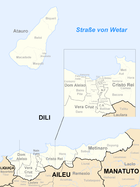
Dili is the seat of the administration of the district of Dili, which is the administrative entity of the area and includes the island of Atauro and some cities close to Dili city. The city is part of the subdistricts of Nain Feto, Vera Cruz, Dom Aleixo and Cristo Rei and is divided into several sucos, which are headed by a elected chefe de suco. 18 of the 26 sucos of the four subdistricts are categorized as urban.[1] There is no city administration beside the district administrator, who was appointed by state gouvernment. The Timorese gouvernment started to plan in 2009 to change the status of districts into municipalities. These will have an elected mayor and council.[2]
History
Dili was settled about 1520 by the Portuguese, who made it the capital of Portuguese Timor in 1769. During World War II, Dili was occupied by the Japanese (see Battle of Timor). East Timor unilaterally declared independence from Portugal on November 28, 1975. However, nine days later, on December 7, Indonesian forces invaded Dili. On July 17, 1976, Indonesia annexed East Timor, which it designated the 27th province of Indonesia, Timor Timur (Indonesian for East Timor), with Dili as its capital.
A guerrilla war ensued from 1975 to 1999 between Indonesian and pro-independence forces, during which tens of thousands of East Timor's and some foreign civilians were killed. Media coverage of the 1991 Dili Massacre helped revitalise international support for the East Timorese independence movement. In 1999, East Timor was placed under UN supervision and on May 20, 2002, Dili became the capital of the newly independent Democratic Republic of Timor-Leste. In May 2006, fighting and rioting sparked by conflict between elements of the military caused significant damage to the city and led to foreign military intervention to restore order.
Buildings and monuments
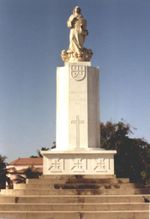
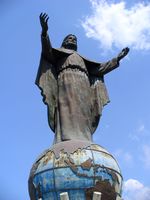
Most buildings were damaged or destroyed in the violence of 1999, orchestrated by the Indonesian military and local pro-Indonesia militias (see Operation Scorched Earth).[3] However, the city still has many buildings from the Portuguese era. The former Portuguese Governor's office is now the office of the Prime Minister. It was previously also used by the Indonesian-appointed Governor, and by the United Nations Transitional Administration in East Timor (UNTAET).
Even under Indonesian rule, during which the Portuguese language was banned, Portuguese street names like Avenida Marechal Carmona remained unchanged, although they were prefixed with the Indonesian word Jalan or 'road'. The Roman Catholic Church at Motael became a focus for resistance to Indonesian occupation. Legacies of Jakarta's occupation are the Church of the Immaculate Conception, seat of the Roman Catholic Diocese of Díli, purportedly the largest cathedral in Southeast Asia, and the 'Integration Monument', commemorating the Indonesian annexation of the territory in 1976. Featuring a statue of a Timorese in traditional dress, breaking the chains round his wrists, the monument has not been demolished.
The Cristo Rei of Dili is a 27 metre (88.6 ft) tall statue of Jesus situated on top of a globe at the end of a peninsula in Dili. It is one of the main tourist attractions in East Timor, and is claimed to be the second tallest statue of it's kind.[4] It was a gift from the Indonesian Government.
Education
Schools in Dili include St. Joseph’s High School (Colégio de São José). There are three International schools in Dili, an Australian managed school by the name of Dili International School, an American government sponsored school, called Quality International School and the Dili Education & Development Center, a Philippine International School. East Timor's major higher education institution, the Universidade Nacional de Timor-Leste, is based in Dili.
Transportation
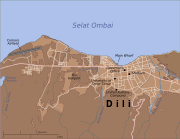
Dili is serviced by Presidente Nicolau Lobato International Airport, the only functioning international airport in East Timor, though there are airstrips in Baucau, Suai and Oecusse used for domestic flights. Until recently, Dili's airport runway has been unable to accommodate aircraft larger than the Boeing 737 or C-130 Hercules, but in January 2008, the Portuguese charter airline EuroAtlantic Airways operated a direct flight from Lisbon using a Boeing 757, carrying 140 members of the Guarda Nacional Republicana.[5] Under Portuguese rule, Baucau airport, which has a much longer runway, was used for international flights, but following the Indonesian invasion this was taken over by the Indonesian military and closed to civilian traffic.
Sister cities
Gallery
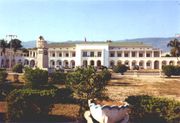 Government Palace |
View of Dili |
 Old Portuguese Canon in Dili |
 Architecture of Dili |
 Dili at Dawn |
Markets |
 Memorial to Prince Henry the Navigator |
 Motael Church |
 Dili from air |
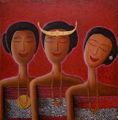 Modern Painting of Arte Moris |
 The Cathedral of the Immaculate Conception in Vila Verde |
Ministry of Foreign Affairs |
References
- ↑ List of Timorese administrative entities
- ↑ Council of Ministers Approves Law Proposals on Local Governance
- ↑ ↑ Dili District Development Plan 2002/2003
- ↑ Cox, Christopher, Tourism in Timor? Travel & Leisure, March 2004
- ↑ euroAtlantic lands at Dili airport transporting GNR
External links
- Discover Dili - Tourism promotion site
|
|||||||